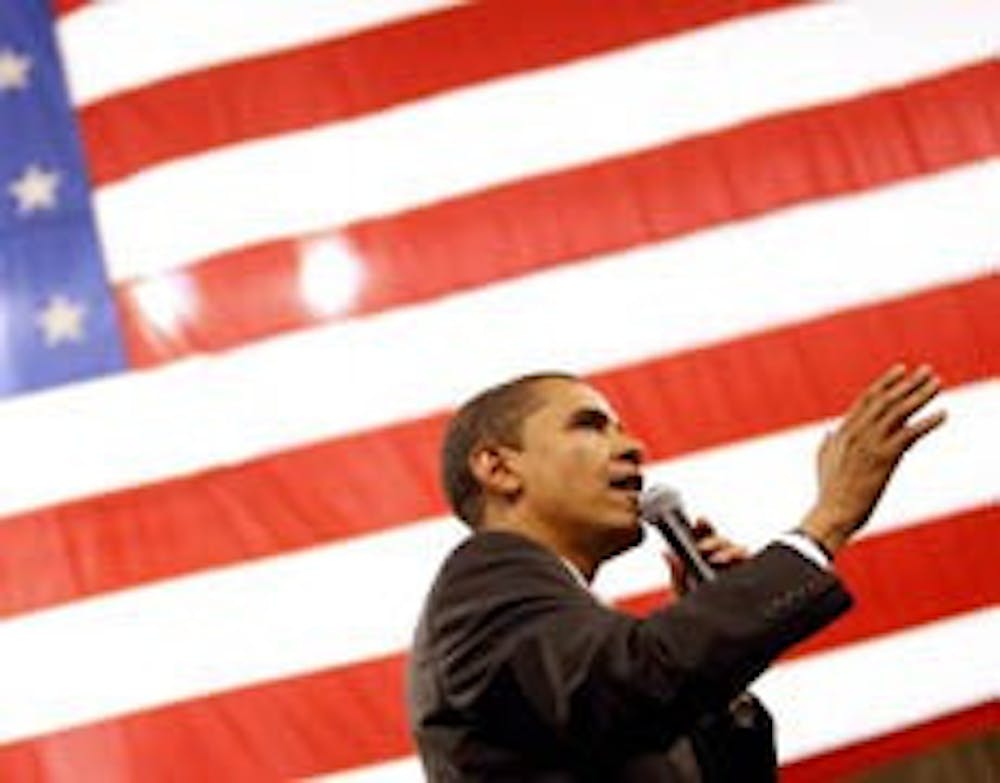A fierce battle is raging within the United States' borders, but the weapons are ideological rather than physical.
The three remaining candidates in the 2008 presidential race offer starkly differing points of view on what should be done about the war in Iraq.
Sens. Hillary Clinton, D-N.Y., and Barack Obama, D-Ill., are still in the race for the Democratic nomination, while Sen. John McCain, R-Ariz., secured the nomination of the Republican party on March 4.
When one of these candidates is sworn in on Jan. 20, 2009, there is no question that the strategy in Iraq will change drastically. But the way it will change will depend on what America's voters decide.
Here are the presidential candidates' plans relating to the war in Iraq:
Barack Obama, Democrat
An early critic of what he called a "rash war," Obama spoke out against the war in Iraq as a candidate for the United States Senate in 2002.
He plans to begin removing the troops from Iraq immediately upon being sworn in, according to the Obama campaign Web site.
His plan will remove one or two combat brigades each month, and Obama would pull all combat brigades out of Iraq within 16 months.
If al-Qaida builds a base within Iraq, Obama said he would keep troops in the country to carry out strikes on the terrorist organizations, a position McCain has criticized, saying the terrorist group is already in Iraq. Obama has countered that the group wouldn't be there if lawmakers like McCain hadn't supported the war.
Still, he would not build any permanent bases in Iraq.
Obama points to his stance against the war in its early days as evidence of his resolve to end the conflict.
"Too many took the president at his word instead of reading the intelligence for themselves," Obama said on his Web site. "Our only opportunity to stop the war was lost. I made a different judgment. I thought our priority had to be finishing the fight in Afghanistan."
Hillary Clinton, Democrat
One of Congress's most outspoken opponents of the war, Clinton has urged President George W. Bush to immediately pull the troops out of Iraq.
Clinton originally voted for the Iraq war resolution, a vote her Democratic rival, Obama, has criticized her on.
According to her Web site, Clinton's three-part plan would start by convening the Joint Chiefs of Staff, the National Security Council and the Secretary of Defense to draw up a plan to bring the troops home within her first 60 days in office.
She also proposes directing aid to the Iraqi people, while not propping up the government, and would support the appointment of a United Nations representative to work toward peace among the political parties in Iraq.
Clinton would continue to fund anti-terrorism efforts by ordering specialized units to engage in operations against al-Qaida and other terrorist organizations in Iraq.
Still, her intention to pull the troops out of Iraq remains the basis for her military plan of action.
"The right strategy before the surge and post-escalation is the same — start bringing home America's troops now," Clinton said on her Web site.
John McCain, Republican
With 22 years of experience in the United States Navy, McCain perhaps has the most intimate knowledge of warfare of any of the candidates.
In the Vietnam War, he was taken as a prisoner of war and broke both his arms and a leg in the conflict.
McCain's first priority would be to commit a greater number of troops to the war in Iraq, with the purpose of clearing insurgent strongholds and strengthening the Iraqi Armed Forces.
On his campaign Web site, McCain says the ultimate goal of the U.S. is to give the Iraqi people the ability to have governance over themselves.
He also plans to "win the homefront" by reinvigorating the American people and explaining what is at stake in the war to ensure that people fully understand the cost of pulling out the troops.
"Iraq's transformation into a secure democracy and a force for freedom in the greater Middle East is the calling of our age," McCain said in a statement on his Web site. "We can succeed."
Reach the reporter at: leigh.munsil@asu.edu.






